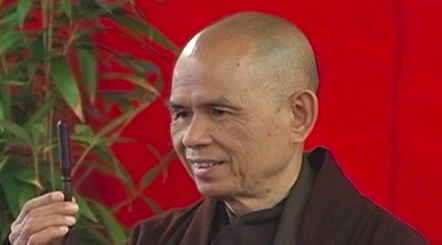 Vincent and Thich Nhat Hanh: Mindfulness for Managers
Vincent and Thich Nhat Hanh: Mindfulness for Managers
Is there a connection between the teachings of the Catholic Saint of the 17th Century, Vincent de Paul, and the ancient practice of mindfulness meditation espoused by Zen Buddhism? If so, what benefit might that connection offer to being a better leader and manager in the 21st Century? To begin to answer this question, we turn to the writings of Thich Nhat Hanh, the great Vietnamese Zen Master, and then look at what Vincent might have to say about it. This the issue addressed in one of a series of articles presented by the Vincent on Leadership: The Hay Project at DePaul University.
Thich Nhat Hanh on Mindfulness
Thich Nhat Hanh says the term mindfulness refers to “keeping one’s consciousness alive to the present reality.” He invites us to develop the practice for our everyday activities as an ongoing practice, not just something reserved for private meditation periods. In his book, The Miracle of Mindfulness: A Manual on Meditation, he uses simple, daily examples to invite a practice of mindfulness, like, “washing the dishes, one should only be washing the dishes.” In his chapter on practices, he suggests bringing total consciousness to whatever we are doing. Writing about making a cup of tea, he says:
“Do each movement slowly, in mindfulness. Do not let one detail of your movements go by without being mindful of it. Know that your hand lifts the pot by its handle. Know that your are pouring the fragrant warm tea into the cup. Follow each step in mindfulness.”
Being conscious of one’s breathing can help bring one back to mindfulness. “Breathe gently and more deeply than usual. Take hold of our breath if your mind strays.”
In another book, The Heart of the Buddha’s Teaching, Thich Nhat Hanh tells a story about a man whom a horse and its rider suddenly pass. As the horse gallops quickly by the man shouts to the rider “where are you going?” to which the rider responds “I don’t know! Ask the horse.” The horse, Thich Nhat Hanh explains, represents the habit energy that unwittingly pulls us along until, mindful of it, we begin to assume control as the rider.
Vincent de Paul and Mindfulness
Vincent did not study Zen Buddhism. His teachings and practices come out of a Christian context. However, there seems to be a sense within his writings that he was aware of the idea of properly focusing one’s mind that allowed for a more effective carrying out of one’s ministry.
In writing on Vincent’s remarkable accomplishments, Hugh F. O’Donnell, C.M., observes that Vincent had his own style of mindfulness. It involved being attentive to the unfolding of events in God’s time, not his own. He referred to God’s being in charge as “Providence.” For Vincent, God and not the horse of his own energy, as in Thich Nat Hanh’s story, was in charge. AS O’Donnell writes, “Choosing not to tread on the heels of Providence, he accomplished more than those who acted in self-reliant haste.”
Vincent himself put it this way in one of his well known maxims: “Let us abandon ourselves to the providence of God and be very careful not to run ahead of it.” He also said, “Good works are often spoiled by moving too quickly.”
Speaking in the language of his own context,Vincent invited his companions in ministry to focus their minds through the practice of meditating on God, and through other forms of prayer. These practices would have the same effect as Zen meditation in the positive and calming behaviors exhibited by the practitioners. Here are a few more of Vincent’s guiding quotations:
“If God is the centre of your life, no words will be needed. Your mere presence will touch their hearts.”
“Proceed quietly, pray a great deal, and act together.”
“There is nothing more in keeping with the gospel than on the one hand to gather up light and strength for the soul in prayer, spiritual reading, and solitude, and then go forth and dispense this spiritual good to humanity.”
“In the name God, if we are forced through necessity to hasten, let us hasten slowly, as the proverb says.”
Though Vincent de Paul lived in a very different time and culture from Thich Nhat Hanh, both seem to have acquired a similar approach to effectively negotiating the complexities and demands of life by turning to the wisdom of their respective spiritual traditions. We invite you to reflect on how acting mindfully might improve your own leadership and management.
Reflection Questions
- What benefits to your work performance do you think could result from your developing a mindfulness practice?
- When was the last time you examined your managerial habits for their effectiveness?
- When was the last time you arrived at a meeting having forgotten the documents you needed?
- When was the last time you thoughtfully pondered an incoming email message and its sender before dashing off a response?
- What resource/tradition might you draw on to help develop a mindfulness practice?
- Who is someone who can help support you in developing this practice?
Resources
Hugh O’Donnell, C.M., “Vincent de Paul: His Life and Way” in Vincent de Paul and Louise de Marillac: Rules, Conferences and Writings. Classics of Western Spirituality Series. Edited by John Rybolt, C.M., and Frances Ryan, D.C. 1995. Used with permission.
The Little Book of St. Vincent de Paul. Compiled by Don Mullen. 2005.35
Timely Quotes of St. Vincent de Paul St. Joseph Seminary, Evansville, IND.







0 Comments